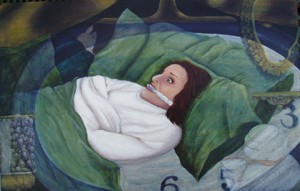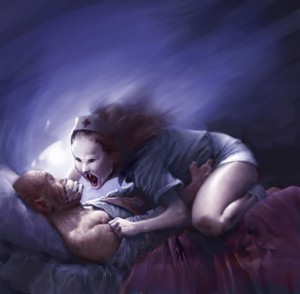-
Recognizing Sleep Paralysis Symptoms
Sunday, July 6th, 2025by Dr. Gregory Brown
When it comes to sleep disorders, one of the most mysterious, bizarre and terrifying has to be sleep paralysis. Treating this ailment is often difficult, because sleep paralysis is not well-understood.

One way to put the mind at ease is to better understand sleep paralysis symptoms. This can be a first step to achieving some measure of control over the problem, thus reducing anxiety.
Sleep Paralysis Myths
This problem has been misunderstood for centuries and has become the stuff of legend. Sleep paralysis has been dubbed “old hag.” This refers to the myth that paralysis while sleeping was caused by witches or witchcraft.
These superstitions have persisted for hundreds of years, and even today some people believe that sleep paralysis demons are real. It’s important to explore the issue in depth in order to put these old wives’ tales to rest.
The phenomenon of being paralyzed while asleep has been experienced for thousands of years. Explanations for this have been connected to peculiar and unique figures in local legend or folklore.
Shadowy creatures lurking in the homes and bedrooms of sufferers is an experience reported over and over. The bizarre, often terrifying nature of these experiences has left its victims grasping for explanations.
Sleep Paralysis Demons
Many people associate sleep paralysis with an evil or demonic presence. Demons, vampires, witches or even aliens are thought to be responsible.
For a person who has never had an experience like this, it is difficult to empathize with a sleep paralysis sufferer. Moreover, those who have been victimized will have a hard time explaining what sleep paralysis feels like to others in a way they can understand.
At its essence, sleep paralysis is simply the condition of becoming paralyzed while asleep. Normally when an individual goes to sleep, the motor functions of the body shut down so that the person won’t act out their dreams.
In reality, however, people often twitch, kick and even sleepwalk during sleep time. With this particular sleep disorder, the problem lies in becoming suddenly awake, yet the body remains unable to move.
During an attack of sleep paralysis, the body can remain unresponsive and unable to move for as briefly as a few seconds, or as long as several minutes. The sensation of being awake, yet unable to move, can be terrifying and at times traumatic.
Sleep Paralysis Hallucinations
 Another important and bizarre aspect of this disorder is the experience of vivid hallucinations. These hallucinations take on many manifestations, and can seem very real.
Another important and bizarre aspect of this disorder is the experience of vivid hallucinations. These hallucinations take on many manifestations, and can seem very real.For the awake victim who is unable to move, this can create a frightening experience. The hallucinations can take on many forms, the most common being shadowy figures that stare at the victim, or sit on their chests while screaming into their face.
For those people who have never experienced this sleep disorder, such sleep paralysis stories may seem ridiculous or far fetched. But the truth is that sleep paralysis is a genuine medical condition.
Not enough is known yet about the problem, and treatment options are therefore still limited. The one saving grace is that paralysis while sleeping and its accompanying hallucinations don’t happen very often. This differs from sleep deprivation symptoms, which are much more common.
Treatment for Sleep Paralysis
Sleep paralysis is experienced more often by individuals who are sleep deprived, so getting enough sleep may help to reduce the number and frequency of episodes. The average adult needs at least six hours of sleep per night.
Maintaining a regular sleeping schedule where you go to bed at the same time each night and get up at the same time each morning can also be of great help.
Here are some more tips for overcoming the symptoms of sleep paralysis:
- Finding a place to sleep that is dark, quiet and comfortable.
- Making sure your bed is comfortable.
- Taking moderate and regular exercise.
- Reducing your intake of caffeine.
- Quitting smoking (nicotine is a stimulant).
Medications for Sleep Paralysis
Antidepressants can affect mood and are normally used to treat depression, but there are times when they are prescribed to treat severe sleep paralysis. If an individual’s sleep paralysis is causing them major problems, a physician may prescribe an antidepressant medication such as the tricyclic antidepressant Clomipramine.
This particular sleep paralysis medicine is believed to work by altering the amount and depth of a person’s REM sleep. Doing so helps prevent temporary paralysis when a person falls asleep or awakens, and it should also help reduce any hallucinations an individual may experience.
Sleep paralysis sufferers often are advised to take this medication for several weeks to see whether or not it mitigates their symptoms. While natural sleep paralysis cures are always preferable, a doctor at a sleep disorder clinic may try medication in more serious cases.
(published January 3, 2011)


